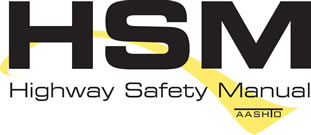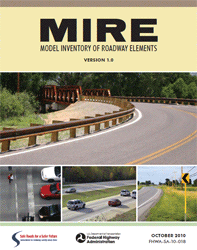Projects
Highway Safety Manual
The Highway Safety Manual (HSM) provides
transportation professionals with knowledge, techniques, and methodologies to quantify the
safety-related effects of transportation decisions. The HSM facilitates integrating quantitative
safety performance measures into roadway planning, design, operations, and maintenance decisions.
If you are using the HSM now, or are considering using it, technical assistance can help you:
- Identify sites with the most potential for crash reduction.
- Identify factors contributing to crashes and associated potential countermeasures to address
these issues.
- Evaluate the crash reduction benefits of implemented treatments.
- Conduct economic appraisals of improvements to prioritize projects.
- Calculate the effect of various design alternatives on crash frequency and severity.
- Estimate potential crash frequency and severity on highway networks, and the potential effects
of transportation decisions on crashes.
There is good news! The FHWA Office of Safety provides free safety data technical assistance through the two technical assistance programs designed to help agencies improve the quality of their roadway data.
Roadway Data Improvement Program
The Roadway Data Improvement Program (RDIP) helps transportation agencies improve the quality of their roadway data to better support safety and other improvement initiatives. The RDIP focuses on the content, process, and practices used by the agency for collecting, managing, and utilizing their roadway data.
Technical assistance can help your agency improve data collection across these key areas:
- Roadway Data Collection and Technical Standards
- Data Analysis Tools and Uses
- Data Management and Governance
- Data Sharing and Integration
A technical assistance team provided by the RDIP reviews and assesses a state's roadway data system for the content of the data collected, ability to use, manage and share the data and to offer recommendations for improving the roadway data. The RDIP also examines the State's ability to coordinate and exchange roadway data with local agencies such as, cities, counties and MPOs. The RDIP is ultimately intended to help states improve the roadway data the State uses to develop their Strategic Highway Safety Plan (SHSP), which supports the State's Highway Safety Improvement Program (HSIP).
More information about RDIP is available in the Roadway Data Improvement Program: Supplemental Information Resource.
Apply to the RDIP
Agencies may initiate the RDIP process by completing and submitting the Office of Safety's online technical assistance application. Please note: When you arrive at the application, the "Data and Analysis Tools" option – the option needed to initiate RDIP – will be pre-selected on the application. Simply fill in the other fields on the application and follow the instructions.
Roadway Data Extraction Technical Assistance Program (Spring 2015)
The Roadway Data Extraction Technical Assistance Program (RDETAP) is in development. It is intended to assist states to identify, extract and record Model Inventory of Roadway Elements (MIRE) from commonly available existing sources of data, such as State video logs, Google Earth and Bing street view maps. The RDETAP will build upon a technique of data extraction that was pilot tested with the New Hampshire DOT as part of the MIRE Management Information System project in 2012-2013.
The RDETAP will include a RDETAP Guide to provide instruction on how to extract roadway data and translate it into a state's roadway inventory system. It will also provide direct technical assistance to state DOTs and local agencies (e.g., cities, counties, MPOs, LTAPs etc.) that need more "hands-on" instruction in how to use the data extraction techniques, with the intent that a cadre of individuals within that state are trained in how to identify and extract the data elements intended for collection. The technical assistance portion of the RDETAP is expected to be ready in the Spring of 2014. If you have questions about the program, contact Robert Pollack at (202) 366-5019.
The Office of Safety Technical Assistance Program (the Peer-to-Peer Program)
All other roadway safety data technical assistance is available through the Office of Safety's technical assistance program. For more information, and to apply for assistance, visit the technical assistance page on the Roadway Safety Professional Capacity Building Program website.
Topics
Data Collection
Focuses on roadway inventory data and its integration with crash and traffic volume data to
enable use of state-of-the-practice safety analysis methods.
Data Analysis
Focuses on applications of state-of-the-practice safety analysis tools in safety management,
planning, and project development processes.
Data Management
Focuses on policies, procedures, and personnel exist for the effective management of roadway
safety data.
Data Interoperability
Focuses on how roadway safety data relates to other data. Additionally, it considers whether
existing data can be expanded as new technologies and tools are developed in the future, or
as needs change.
Tools/Software
A virtual or onsite demonstration of software attributes, default value and result interpretation.
This is a demonstration of software applicability and uses not an application to specific
condition or circumstance.
Local Data Systems/Issues
Technical assistance for local agencies, municipalities, counties, and MPOs that may have less robust safety data systems.





